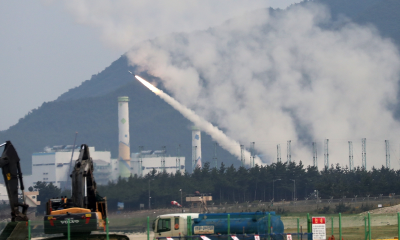Context-
Recent developments in the Korean Peninsula have heightened concerns globally, as tensions between North and South Korea escalate. The dismantling of the Arch of Reunification in Pyongyang and a series of provocative actions by North Korea signal a significant shift in dynamics, posing challenges to regional security and major power rivalries.
Historical Context
● The division of the Korean Peninsula post-World War II resulted in contrasting ideologies and geopolitical alliances, setting the stage for the Korean War (1950-1953). The conflict entrenched the division between North and South Korea along ideological lines, mirroring the broader Cold War divide. Despite the cessation of active hostilities, ideological differences, and geopolitical alignments have persisted, shaping the contemporary landscape of the peninsula.
● Efforts to address North Korea's nuclear ambitions have been sporadic, marked by agreements such as the 1994 Agreed Framework and the 2003 Six-Party Talks. However, subsequent nuclear tests and missile launches underscored North Korea's determination to advance its strategic capabilities, posing a persistent challenge to regional stability.
Recent Escalation
● North Korea's recent actions, including the renunciation of reunification efforts and the formal classification of South Korea as an adversary, represent a departure from longstanding objectives. Kim Jong Un's address to the Supreme People's Assembly highlighted a strategic shift in North Korea's stance, accompanied by the dismantling of symbols associated with reunification.
● The deployment of advanced missile systems and tests of hypersonic weapons underscore North Korea's efforts to enhance its military capabilities and project power regionally. These actions have elicited responses from South Korea, the United States, and Japan, exacerbating regional tensions and raising concerns about the potential for conflict.
Implications for Regional Security and Major Power Rivalries
● The escalating tensions in the Korean Peninsula occur against the backdrop of broader geopolitical dynamics and major power rivalries. The involvement of key stakeholders, including the United States, China, and Russia, underscores the complex interplay of interests and alliances in the region.
● North Korea's deepening ties with China and Russia signal a strategic realignment, with implications for regional security and major power dynamics. China's steadfast support for North Korea and Russia's engagement underscores the shifting geopolitical landscape, as both countries navigate their strategic imperatives amidst global uncertainty.
● Consolidating military alliances and joint exercises between South Korea, the United States, and Japan reflect efforts to deter North Korean aggression and preserve regional stability. However, the risk of inadvertent escalation remains high, given the volatile nature of the Korean Peninsula and the potential for miscalculation.
India's Position in the Korean Conflict
● India's Perspective: India has consistently opposed North Korean nuclear and missile tests while maintaining a neutral stance on sanctions imposed on the nation. Notably, during the Korean War (1950-53), India played a pivotal role in brokering a cease-fire agreement between the conflicting parties.
● India's Relations with North and South Korea: India's relationship with South Korea was elevated to a 'special strategic partnership' in May 2015, reflecting the depth of bilateral ties. India's Act East Policy aligns with South Korea's Southern Policy, fostering economic cooperation and strategic collaboration beyond immediate regions. Similarly, India's diplomatic relations with North Korea, spanning over 47 years, uphold the legacy of India's commitment to the Non-Alignment Movement.
The Way Forward:
● Given the evolving geopolitical landscape post-Covid and global economic challenges, North Korea may prioritize strengthening its fragile economy. As dialogue among key stakeholders on the Korean Peninsula resumes, India stands poised to contribute constructively to peace and security efforts.
● Continued engagement with North Korean leadership positions India favorably to facilitate dialogue and promote stability in the region. As circumstances evolve, India's proactive involvement can significantly foster peace and security on the Korean Peninsula.
Conclusion
The escalating tensions in the Korean Peninsula underscore the complexities of regional security and major power rivalries in the 21st century. The dismantling of symbols associated with reunification and North Korea's provocative actions pose significant challenges to stability, necessitating a coordinated and diplomatic approach to de-escalation.
As key stakeholders navigate competing interests and strategic imperatives, the importance of dialogue and diplomatic engagement cannot be overstated. The Korean Peninsula remains a flashpoint in global geopolitics, with far-reaching implications for regional security and major power dynamics. A concerted effort to address underlying grievances and pursue peaceful resolution is imperative to avert conflict and foster enduring stability in the region.
|
Probable Questions for UPSC Mains Exam-
|
Source - The Hindu







